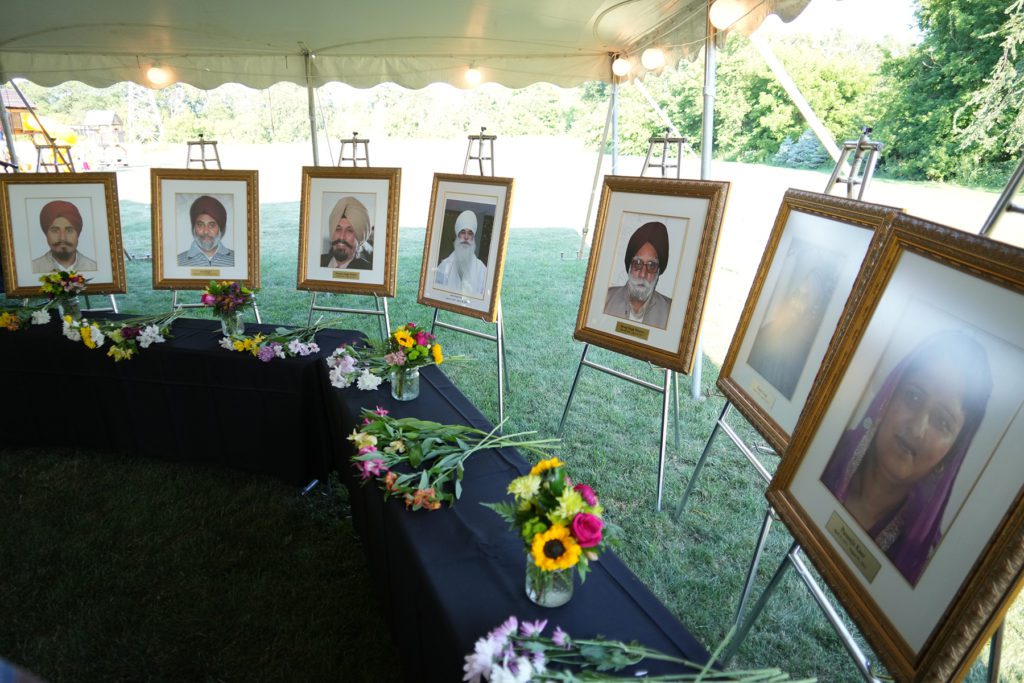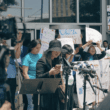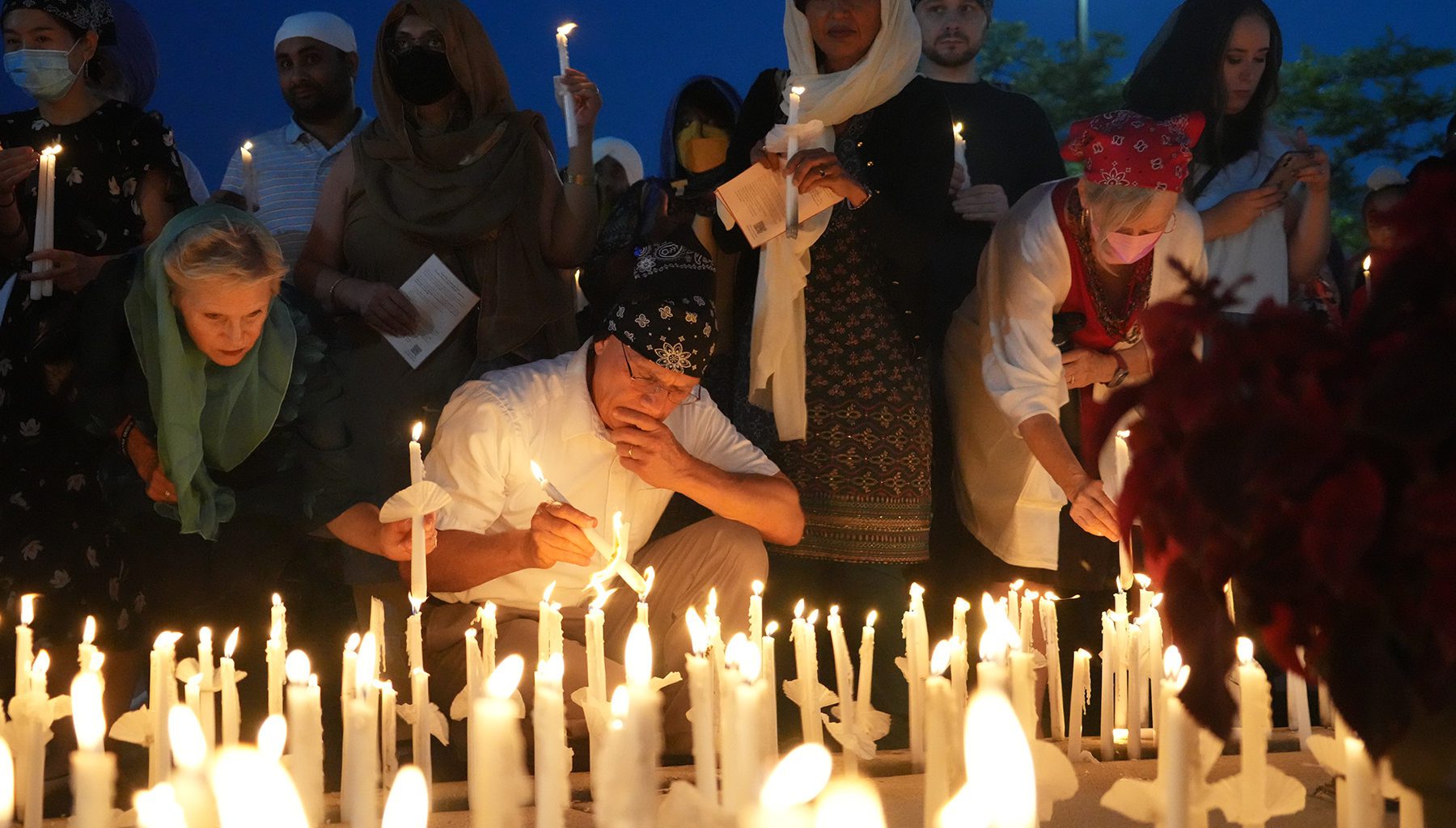Sign up here to receive The Yappie's weekly briefing on Asian American + Pacific Islander politics and support our work by making a donation.
ON AUG. 5, 2012, 40-year-old Wade Michael Page, a white supremacist and U.S. Army veteran, entered the Sikh Temple of Wisconsin with a gun. He fatally shot six worshippers and critically wounded four others. A seventh person died later of his injuries.
This past weekend, community members converged in Oak Creek, Wisconsin to mark the 10th anniversary of the mass shooting, the deadliest attack on Sikh Americans in U.S. history.
Gathered under a large white tent outside the temple, Sikh Americans, local neighbors, law enforcement officers, and lawmakers sat alongside friends and families of the seven people who lost their lives that day.
Friday’s ceremony opened with a drum performance led by Sikh youth as people took their seats. “Heal. Unite. Act.” read a large white banner behind the stage.
The vigil, which began with an interfaith prayer, was open to the public. Many speakers, including non-Sikhs, wore yellow cloth head coverings brandished with the Khanda, a symbol of the Sikh faith. Nearly every speaker named each of those who were killed.
The 10-year anniversary evoked questions “centered around both tragedy and triumph,” according to activist and community leader Pardeep Kaleka—son of Satwant Singh Kaleka, one of the seven people killed at the gurdwara. The Oak Creek remembrance events redemonstrated the Sikh community’s ability to come together in the face of horrific acts of violence that have occured over the past decades, Kaleka said—their collective action presents a model of healing, solidarity, and political activism that can be used to tackle the long-standing issue of hate crimes in America more broadly.
“A gurdwara is a place of teaching,” Kaleka noted. “What we show the world, what we show each other, is what people can learn from us.” His father founded the Sikh Temple of Wisconsin and died fighting Page in order to protect others.
“Their voices, their prayers were silenced,” said James Santelle, the U.S. attorney for the Eastern District of Wisconsin at the time of the shooting. His voice wavered as he read each victim’s name.


The shooter went from “American patriot to American terrorist,” said Amaris Kaur Kaleka, the grandaughter of Satwant Singh Kaleka. Page, who led a white power band, killed himself after opening fire with a semi-automatic gun which he legally purchased in Wisconsin. “I do forgive you, though,” she continued, citing tenets of the Sikh faith.
“We stand in solidarity with our Sikh brothers and sisters,” said Janan Najeeb, president and CEO of the Milwaukee Muslim Women’s Coalition. “This hatred has not differentiated between Sikhs and Muslims.”
Erika Moritsugu, deputy assistant to the president and Asian American, Native Hawaiian, and Pacific Islander senior liaison at the White House, delivered remarks on behalf of President Joe Biden.
“It is up to all of us to deny this hate safe harbor,” Moritsugu said, reading a letter from Biden. She also noted the importance of curbing gun violence, an issue that remains gridlocked in Congress.
For Sikh community members, the Oak Creek shooting was a symptom of the post-9/11 rise in anti-Muslim sentiment in the United States. “We all know where we were on Aug. 5, 2012,” Pardeep Kaleka said—acknowledging the many others who, like himself, lost a family member or a friend ten years ago. His words echoed the phrase many Americans have used to describe the 9/11 attack itself.
Reported hate crimes against Muslim Americans, which spiked by more than 1600% following 9/11, have decreased over the last two decades. Yet Islamophobia and white supremacy have persisted—and with it the vilification of anyone who is mistaken as Muslim.
Sikhs were the third most targeted faith community in the U.S. in 2020, according to the FBI’s annual report on hate crimes and bias. Last April, Sikhs across America feared a repeat of Oak Creek after a mass shooting at a FedEx facility in Indianapolis killed eight people, including four Sikh Americans.
Despite continued attacks, the Oak Creek shooting has helped spur in the policymaking sphere greater awareness of acts of violence against Sikhs, Muslims, Arabs, and South Asians, in large part due to the efforts of Sikh activists and community organizers. Harpreet Singh Saini—whose mother Paramjit Kaur was another one of the seven Oak Creek victims—testified before the U.S. Senate in 2012 in a hearing demanded by over 150 organizations. These calls for accountability led the FBI to finally begin tracking hate crimes against Sikhs as a separate category in 2015.
On the same day as the vigil, the White House published a fact sheet acknowledging the anniversary. In the press release, the Biden administration mentioned various actions including an interagency working group and a Department of Justice pilot initiative to “enhance the sharing of threat information with community and faith-based partners.”
The day before, the Sikh Coalition released a letter, signed by 89 gurdwaras, urging Biden to take “immediate action” to prevent further acts of “targeted hate violence.” The letter called for passage of the Nonprofit Security Grant Program Improvement Act, which would expand the program that has funded the protection of nonprofits and houses of worship against terrorist attacks. It also noted the need for technical assistance and language accessibility to ensure equitable access for all applicants.
The Sikh Coalition has separately advocated for Congress to pass two additional pieces of legislation. The Domestic Terrorism Prevention Act would require the Department of Justice, the Department of Homeland Security, and the FBI to jointly investigate, report on, and prosecute acts of domestic terrorism, including those motivated by white supremacist ideologies. The act passed in the House earlier this year but was filibustered in the Senate.
Meanwhile, the Justice for Victims of Hate Crimes Act, proposed in the Senate in 2020, would amend previous legislation to clarify the language used to define a hate crime. By explicitly stating that perceived bias must be a “substantial motivating factor”—but not the sole factor, as has been argued in the courts in the past—in an act of violence, the new act would allow the DOJ to prosecute a much larger share of hate crimes per the law’s original intent, the Sikh Coalition says.
At the end of Friday’s event, members of the Sikh Temple of Wisconsin carved out a pocket of time for themselves, singing a song of worship as volunteers passed out candles among the audience members. It was a poignant display of one of the core principles of Sikhism in the face of pain, trauma, and grief—love, never hate.
“If it’s a life that is worth living, we should all have two birthdays,” said Kaleka, addressing his audience with a take on a famous saying. “[That] second birthday is marked not by birth from our mother or our maternal figure,” Kaleka continued. “It is marked by … the reason that we find out why we are alive and what we’re going to do about it. That second birthday is one of purpose, and that second birthday is why we are all here today. Your second birthday was Aug. 5, 2012.”
The vigilance of Oak Creek and Greater Milwaukee’s Sikh community is something to be celebrated, said Kaleka. “How can your community be so hopeful in times of tragedy and challenge?” he asked, posing a question he had received often in the days leading up to Friday’s vigil. “We stay true to our faith. We remain open when people try to close us off.”
The Yappie is your must-read briefing on AAPI power, politics, and influence, fiscally sponsored by the Asian American Journalists Association. Make a donation, subscribe, and follow us on Twitter (@theyappie). Send tips and feedback to [email protected].









